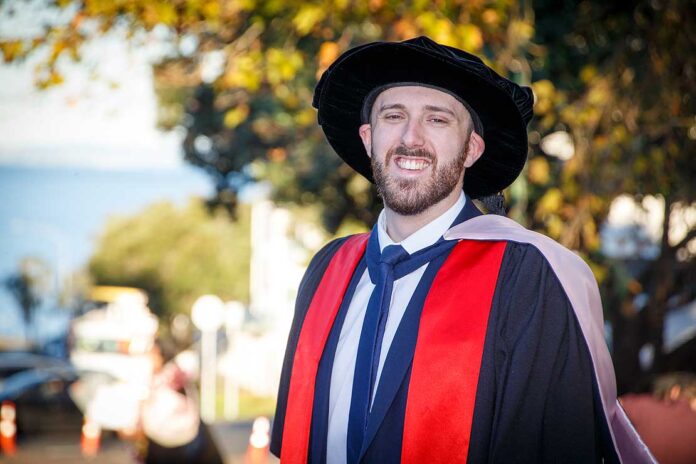Source: Massey University
Nowadays, relationships can form with a swipe of a finger, but little is still known about the psychological reasonings behind the use of dating apps.
Dr Aramis Dennan, a recent graduate of Massey University’s Doctor of Clinical Psychology programme, was fascinated by the way in which an individual’s endorsement of sexist attitudes and beliefs and technology all intersect in the popular apps.
Dr Dennan says when he met his wife in 2012 dating apps were only just starting to take off and he himself has never used one but heard through friends about the trials and tribulations of app-based dating.
“They sounded really interesting! But also really challenging and it got me really interested in the reasons people used dating apps, and wondering whether relationships formed on dating apps worked in similar ways to those formed ‘in real life’.”
Having studied an undergraduate and honours degree that looked at sexism in various forms, Dr Dennan found a passion in this area and was awarded a Massey Doctoral Scholarship to undertake his doctorate. He says he was amazed at the impacts that subjectively positive forms of sexism have.
“I found myself increasingly curious about how things that for so long had been taught as ‘the right ways to treat women’ could have in fact contributed to prolonging generational differences in experiences of the world between men and women.”
The study used an international sample from the US, UK, and Australia with 998 individuals aged between 18 and 35 years sharing whether they had ever used a dating app, as well as completing shortened versions of validated measures of ambivalent sexism and motives for using an app.
Forms of ‘positive’ or benevolent sexism could include the belief that women need men to provide for and protect them, which can both directly and indirectly perpetuate the idea that women should hold disadvantaged status compared to men.
While overall his research only showed limited support for the idea that sexism was related to dating applications, the research did show that if the motive behind using an app was more for “sexual experience” rather than a relationship, negative sexist beliefs had significant influence on the choice to use an app.
This new research is a pivotal point for the discussion on psychology, sexism and dating in the 21st century, an area which up until now has had limited dedicated research.
Dr Dennan says his research is very much a small beginning of a conversation about sexism and its place within the dating application realm, but he hopes that researchers and academics continue work in this field, because it’s such a diverse and interesting landscape to study.
“If we are truly to understand relationships today, and to support people in their quest for relationship success—whatever that may look like for them—we need to better understand how those relationships work within dating applications.”
He believes the reason it’s taken this long for dating apps to make their way into discourse is not only that have people started engaging more with the technology, but also that now dating apps are in the public discussion and normalised, more people feel comfortable asking and answering questions about them.
“It feels like dating apps have been around for ever, but really they’ve only been highly popular for about seven years.
“I think we’re actually about to hit a point where people start producing a ton of interesting, thought provoking work on the psychology of dating apps, and I’m really excited about that.”
Dr Dennan, who is now fully registered as a clinical psychologist, has been working to support our young people in need at Auckland DHB’s Child and Adolescent Mental Health Service—the Kari Centre for the past nine months.
“I have always been passionate about understanding and supporting people to live the most meaningful and effective lives possible and working with young people to understand themselves, their minds and the stories they tell, and where they want their lives to go is such a great experience for me.”
Looking back on his time at Massey University, one of the things that really stood out to Dr Dennan was the freedom he was allowed over his doctorate project.
“I think Massey’s School of Psychology does this really well and that seems to differentiate it from other universities. I went to my supervisors with an idea I thought could be an interesting doctorate and they supported me in being creative and taking ownership of the idea.”
Dr Dennan says his supervision team, Associate Professor Paul Merrick, Dr Kirsty Ross, and Dr Matt Williams, not only offered him valuable support but also helped him look at ideas and thoughts from multiple perspectives and experiences.
“The eyes can’t see what the mind doesn’t know and I was fortunate to have a supportive, experienced, and passionate group in my corner.”
He adds that the people at Massey all played a pivotal role in the completion of his doctorate, from clinical staff who he says helped him grow as a clinician to the other students who shared their insights with him.
“I’d just like to acknowledge and thank Massey University for their support through the Massey Doctoral Scholarship programme. Without that support, the road to completion would have been much more difficult.”
Related articles
PhD graduates tackle New Zealand’s obesity epidemic
Gradutes celebrate academic achievements at Manawatū Graduation
PhD research inspires software startup
Created: 31/05/2021 | Last updated: 31/05/2021



